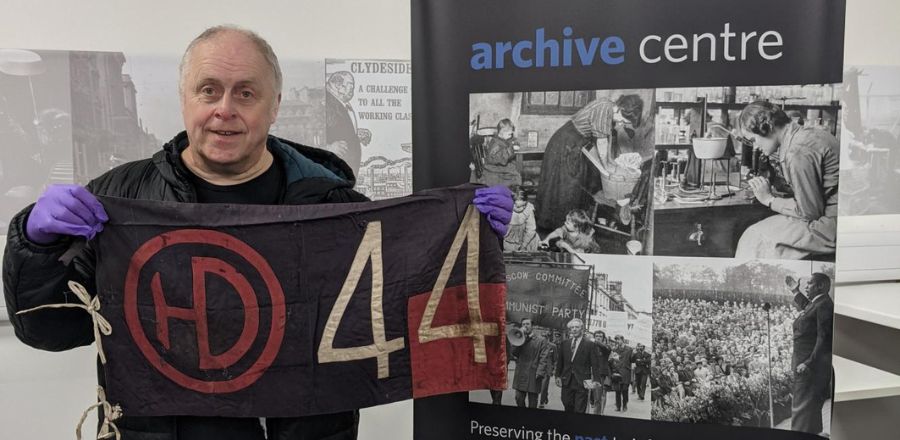PhD student to host Glasgow walking tours as part of the D-Day 80th anniversary

A PhD student is bringing history to life through a series of walking tours in Glasgow, to help tell the stories of people on the home front during World War II.
PhD student Kevin Morrison, who is due to graduate in the summer, is set to host his second series of walking tours as part of the 80th anniversary of the D-Day landings.
Kevin, whose area of research focused on buildings, networks, open spaces and human capital, decided to host the tour to help paint a picture of life for Glaswegians on the home front during the Normandy landings.
Using real life stories, Kevin will share the diary entries from a Scottish writer during the time and visit the Glasgow buildings that played such an important part during the historic moments of 1944.
In collaboration with the GCU Archive Centre, Kevin will help showcase parts of history from Glasgow’s contribution to WWII.
The tours will take place from June 5-8 and will consist of four daily walks, starting at 10.30am, 1.30pm, 4.30pm and 7.30pm.
Developing his research during his PhD study at GCU
“I’ve recently completed my PhD, which looked at four different elements; buildings, networks, open spaces and human capital.
I’m a collector, so I’ve spent years collecting print-based materials about the home front from the second World War. I had actually found a Ministry of Food recipe book which contained a leaflet and it had a stamp from a food office in Glasgow. It got me thinking about what other buildings in Glasgow were used for during that time, and from there I started to think about how cities in general were used during the wartime. The more I read into it, the more started thinking about the infrastructure and how it developed over time.
I decided to approach the University and I attended an open-evening about PhD study. I mentioned how I knew Dr Ben Shepard and how he used my collection, which all related to pieces from the home front here and in Germany. I’m really interested in how ordinary people experienced the war, and Ben really liked my idea. From there, he and Professor Elaine McFarlane took forward my idea as a PhD, which allowed me to look into city infrastructure during the wartime and how it transfers to other cities and other world conflicts.”
Bringing history to life through walking tours
“Over the years, I’ve collected some anecdotal stories from going to the Mitchell Library and visiting archives from all over Glasgow. I really wanted to find a way to share them and I thought that the best way to do that was through a walking tour and actually speak about the buildings, streets and even squares from the past and present. The stories really bring history alive and I wanted to be able to share that with people.
The idea behind the tours is to give those people a voice. I went to see an archive in the Mitchell Library of diaries from the time. I was able to see the diary of a man who was an engineer during the time and it really confirmed to me what the general thoughts of the people during the D-Day period.
When you think about D-Day, you don’t tend to hear about the stories of the people who were back home during that time. I only recently discovered a book which contained some, but apart from that it wasn’t something I was aware of. The focus tends to be on Normandy Beach and the soldiers, but we don’t hear about what it was like for people back home. I wanted to turn that on its head and how it was experienced in Glasgow. It really amazed me to learn about how people felt about it during the time and how little they actually knew about what happened during the day of the landings. There weren’t any huge celebrations or excitement – life just went on as normal and people returned to their daily work.
For the walk itself, we’ve decided to base the movements on a diary from someone called Ruth Henderson, who was a writer at the time. She speaks of how worried everyone felt about what was happening, but also of the excitement that came after it.
What I really love about doing the tours is hearing people share their memories and stories that they might know through the reminders of what they’re seeing during the walk. It’s a friendly, casual atmosphere and everyone is welcome to come and go as they please.”
If you’d like to attend the walking tours, please email Kevin at kmorri34@caledonian.ac.uk
By Rachael McAlonan
Got a SCEBE or GSBS story? Email me at Rachael.McAlonan@gcu.ac.uk or connect with me on social media
